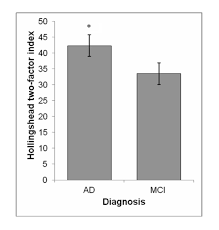BACKGROUND: Dementia affects 15% of Canadians 65 and older, and the prevalence is expected to double over the next two decades. Low socioeconomic status (SES) can increase the risk of Alzheimer’s disease (AD) and the precursor mild cognitive impairment (MCI), but it is unknown what the relationship of SES is on initial clinical presentation to a memory disorders clinic.
METHODS: Data from 127 AD and 135 MCI patients who presented to our Memory Disorders Clinic from 2004 to 2013 were analyzed retrospectively. We examined the relationship between SES (measured using Hollingshead two-factor index) and (1) diagnosis of either AD or MCI; (2) age when first presented to clinic; (3) objective cognitive tests to indicate clinical severity; and (4) the use of cognitive enhancers, medication for treating mild-to-moderate AD patients.
RESULTS: AD patients had lower SES than MCI patients (p < 0.001, r = 0.232). Lower SES was associated with a greater age at initial time of diagnosis (χ2 = 11.5, p = 0.001). In MCI patients, higher SES individuals outperformed lower SES individuals on the BNA after correcting for the effect of age (p = 0.004). Lower SES was also associated with decreased use of cognitive enhancers in AD patients (p < 0.001, r = 0.842).

CONCLUSION: Individuals with lower SES come into memory clinic later when the disease has progressed to dementia, while higher SES individuals present earlier when the disease is still in its MCI stage. There were more higher SES individuals who presented to our memory clinic. Higher SES is associated with better cognitive functioning and increased use of cognitive enhancers. The health policy implication is that we need to better engage economically disadvantaged individuals, perhaps at the primary care level.
PMID: 24331159
SUPPLEMENT:
Alzheimer’s disease (AD) is the most common type of dementia and is associated with significant cognitive and functional decline. Mild cognitive impairment (MCI) is a brain syndrome often considered to be the transition stage between normal aging and Alzheimer’s disease. While there is a genetic component to AD, there are many environmental factors that can influence the onset and progression of the disease. Socioeconomic status (SES), defined by some a measure of educational level combined with occupational attainment, is a factor that has been shown to reduce the risk of AD and dementia, although its effects on MCI have not been as extensively investigated. While it appears that the diseases themselves are more common among low SES population, it is not known how SES impacts medical referral to a memory disorders clinic. Initial presentation is of importance because earlier detection and diagnosis of the disease can lead to more effective treatment with cognitive enhancers, medication for treating mild-to-moderate AD patients.
 Euro
Euro
 US Dollar
US Dollar

